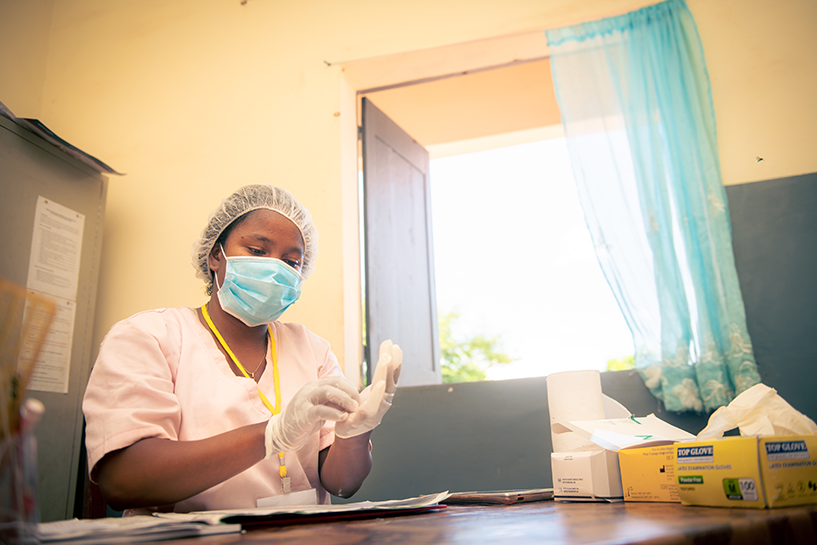COVID-19 Vaccine Introduction in Countries: An Interview with Anton Luchytsky
COVID-19 Vaccine Introduction in Countries: An Interview with Anton Luchytsky
by Dr. Anton Luchytsky, Principal Technical Advisor, Infectious Diseases at MSH


As the COVID-19 pandemic continues to impact communities worldwide, several vaccines have been authorized for emergency use in various countries, with many more in the final stage of clinical trials. The successful deployment of a COVID-19 vaccine has the potential to eradicate the global coronavirus pandemic, but the task is challenging. COVAX, co-led by Gavi, the Coalition for Epidemic Preparedness Innovations, and the World Health Organization (WHO), was established to accelerate the development and manufacture of COVID-19 vaccines and to guarantee fair and equitable access for every country. However, for governments, making decisions on COVID-19 vaccine options and deployment poses complex challenges. Success will depend on how key essential components of the vaccine introduction process are planned, implemented, monitored, and evaluated.
Dr. Anton Luchytsky, Principal Technical Advisor, Infectious Diseases at Management Sciences for Health supporting USAID MTaPS on COVID-19 response and vaccine introduction in low- and middle-income countries (LMICs), talks about challenges and capabilities MTaPS has to assist countries in this process.
You have considerable experience in vaccine introduction, including planning and implementing a large-scale diphtheria campaign in Ukraine and Belarus and providing direction for Gavi’s Accelerated Vaccine Introduction Initiative in several countries. What are some strategies for supporting COVID-19 vaccine introduction in countries and what are the unique challenges?
The WHO has developed a detailed guidance on COVID-19 vaccine introduction that can help plan all key aspects from coordination and regulatory preparedness to costing, delivery strategies, supply chain, and vaccine safety monitoring. However, one of the biggest challenges LMICs face is the lack of access to quality-assured vaccines that have been thoroughly reviewed by functional regulatory agencies. This supply scarcity does not only constrain countries’ ability to put a vaccination plan in motion but also highlights the need to carefully use any emergency use authorizations in resource-limited settings.
In addition, there are several unique challenges to COVID-19. Evidence about the infection, immunity, and vaccine safety and efficacy is constantly evolving. It is important that vaccination managers are knowledgeable about the latest science to make good implementation decisions. Since the approved Pfizer/BioNTech and Moderna vaccines use a new mRNA technology never licensed in humans, safety surveillance accompanying their deployment will be critical. Some vaccines, such as the Pfizer/BioNTech vaccine, must be stored at very cold temperatures, which requires specialized equipment and adjustment of the current inventory management, distribution, and requisition systems. Regulatory support to speed up the introduction of new products at the country level will also be important. While supplies are still limited, people in all countries should have equitable access to the vaccines. Donors may help cover the initial cost in some settings, but countries will need strategies to mobilize resources to scale up and sustain implementation. MTaPS has the capability to address many of these challenges.
How is MTaPS positioned to provide support for this huge undertaking?
The MTaPS team provides expertise in many aspects of pharmaceutical systems strengthening that support vaccine introduction, including evidence-based policy, coordination, and planning; financing strategy; regulatory support for new vaccines and related supplies; procurement and supply management; social mobilization; and monitoring and evaluation (see the fact sheet for more information). We have started working in Jordan where the development of policy briefs on the latest COVID-19 vaccines science as well as advocacy strategies to increase demand for WHO- or FDA-approved vaccines is underway. Activities are also about to start in Bangladesh, Kenya, Rwanda, Cote d’Ivoire, the Philippines, Burkina Faso, Mali, Mozambique, and Senegal. In countries that are introducing multiple COVID-19 vaccines, our support is aligned with USAID’s approach to technical assistance relating to non-approved COVID-19 vaccines.
Researchers are developing hundreds of vaccines: some have reached phase III of clinical testing, while a few are being used already having received approval of regulatory authorities. How does a country decide which vaccine to introduce, and what is the first step donor programs like MTaPS can take in assisting countries with decision making and implementation?
Decisions are typically made by national immunization technical advisory groups (NITAGs), comprising leading experts in the country. Primary considerations include availability – through COVAX and on the open market – cost and budget impact, storage requirements, safety, efficacy, and registration status globally (i.e., emergency use authorizations by WHO). MTaPS can support NITAGs through evidence reviews, comparative analyses, and technical justifications. As a first step toward vaccine deployment, MTaPS may support expedited regulatory pathways for vaccine emergency use authorization or full registration, a system readiness assessment using the WHO tool and development of a national vaccine deployment plan, development of a vaccine safety monitoring system, or an advocacy strategy.
What is the importance of pharmacovigilance in COVID-19 vaccine introduction and how is it accomplished?
Vaccine safety is a key factor for the initial policy decision and throughout the entire immunization campaign, and that’s where pharmacovigilance, also known as safety surveillance for adverse events following immunization (AEFI), comes into prominence. As a key area of expertise for MTaPS, our support encompasses all respective domains, including establishing coordination mechanisms, supporting a COVID-19 vaccine safety monitoring system design and adjusting regulations, data management procedures and platforms, training of health workers and increasing awareness of patients and caregivers to report AEFIs, building capacity of national staff to investigate reports and act upon them, and developing a communication strategy to address potential vaccine mistrust.
Who are MTaPS’ partners in vaccine deployment at the country level?
In Jordan, MTAPS is working with the NITAG, Ministry of Health, regulatory authorities, academic institutions, nongovernmental organizations, WHO, UNICEF, international development banks, and other technical assistance providers.
Lastly, what do you think is going to be key for countries to reach successful immunization and what does it call for?
Vaccine hesitancy among people could be a significant hurdle that countries may face in reaching herd immunity. Overcoming it would require a targeted campaign. As one of our first priorities in Jordan, MTaPS will develop and implement an advocacy strategy for health managers and influential experts at the national and sub-national levels, and training programs for health care workers and journalists.
Dr. Anton Luchytsky, Principal Technical Advisor, Infectious Diseases at Management Sciences for Health, is a global health expert with more than 25 years of experience managing and implementing public health projects in developing countries. In the current role at MSH, he focuses on the design and development of strategies and solutions for COVID-19 response, COVID-19 vaccine introduction, improved infection prevention and control, and pandemic preparedness.